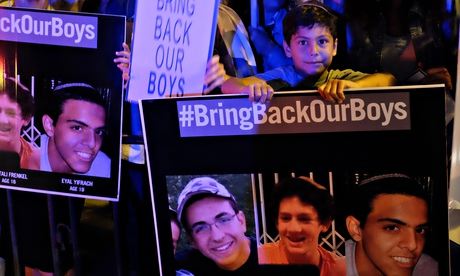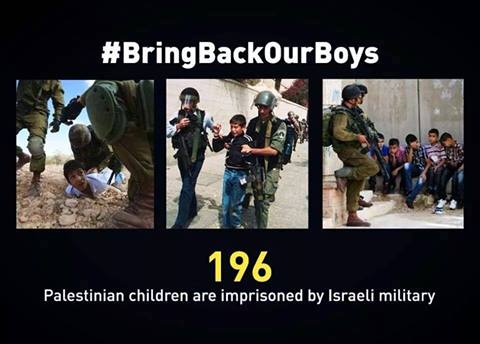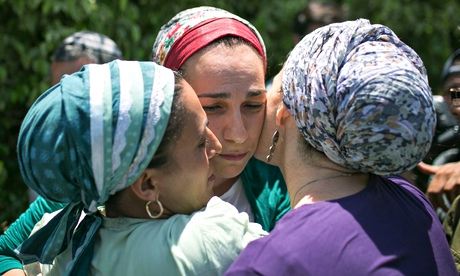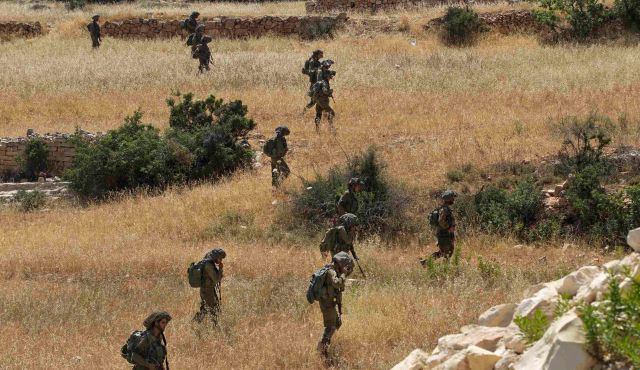Hunt for missing Israeli boys stirs up familiar recriminations in West Bank
 Sunday, June 29, 2014 at 11:31PM
Sunday, June 29, 2014 at 11:31PM http://www.theguardian.com/world/2014/jun/26/hunt-missing-israeli-boys-recriminations
By Peter Beaumont 26 June 2014 The Guradian
 Israeli soldiers search in the hills near Hebron in the West Bank for the missing teenagers. Photograph: Abed Al Hashlamoun/EPA
Israeli soldiers search in the hills near Hebron in the West Bank for the missing teenagers. Photograph: Abed Al Hashlamoun/EPA
Not far from Gush Etzion junction, where three Israeli teenagers – Naftali Frankel, Gilad Sha'ar and Eyal Yifrah – were kidnapped a fortnight ago is a large white plastic banner displaying the boys' faces. It is an image that has become ubiquitous in Israel in the past two weeks.
Further into the southern West Bank, in the village of Dura, outside Hebron, there hangs a different poster, with another boy's face. He is not much younger than two of the missing Israelis – 15-year-old Mohammed Dudeen – who was shot through the heart after climbing out of his bedroom window to join a stone-throwing demonstration against a raid in his village by Israeli soldiers looking for the missing teenagers.
Dudeen is one of five Palestinians killed during the Israeli army's massive manhunt, a search that has seen hundreds arrested and the whole city of Hebron put under military closure, with most entrances to the city sealed off, stopping day workers and business people from entering and leaving.
Amid strong indications that the military operation in its current form might be winding down, the past two weeks have posed as many questions as they have answered. No one has claimed responsibility, although Israel blames Hamas, which has been threatening to kidnap Israelis to trade for prisoners. Last night Israel identified two alleged Hamas members as the central suspects in the abduction. The Shin Bet security service said Marwan Qawasmeh and Amer Abu Aisha are Hamas activists based in Hebron.
But with no word on the fate of the missing boys, a familiar cycle of recriminations has begun, with the kidnapping becoming as much about the politics of the Israeli-Palestinian conflict as about an effort to find them.
UN Watch – an NGO, which among other things monitors the United Nations for perceived anti-Israel bias – last week flew the mothers of the missing youths to address the UN's Human Rights Council, where Rachel Frankel, mother of 16-year-old Naftali, complained not enough was being done internationally to bring back the boys.
On the Palestinian side, both in statements and on social media, there has been a similar complaint: that the Palestinian deaths and arrests and "collective punishment" have been ignored.
 A poster of the missing teenagers held up at a protest in Jerusalem. Photograph: Nir Alon/Zuma Press/Corbis
A poster of the missing teenagers held up at a protest in Jerusalem. Photograph: Nir Alon/Zuma Press/Corbis
 Poster of Palestinian children under Israeli arrest and detention.
Poster of Palestinian children under Israeli arrest and detention.
Amid the recriminations, other critical questions have been thrown up. How much of the search operation has been about finding the boys and how much of it has been directed at trying – not for the first time – to smash Hamas on the West Bank, whom Binyamin Netanyahu, the Israeli prime minister, holds responsible?
The febrile politics swirling around the kidnapping have sucked in other issues too, not least the increasingly acrimonious debate over deals to release Palestinian prisoners, including those freed in exchange for Hamas's release of the Israeli soldier Gilad Shalit. More than 50 of those prisoners have been re-arrested in the wake of the abduction.
"There are two points to this," a senior Israeli officer told the Guardian a week ago. "To bring back the missing boys – who are citizens not soldiers – and find those responsible. The second part of the campaign is not new; it is to target Hamas, a terrorist organisation sitting in Gaza which is trying to re-establish in the West Bank."
In that second sentiment he echoed the words of the Israeli army chief of staff Benny Gantz, who has also said the aim is "to damage Hamas as much as possible". That operation has seen the Israeli army swamp the West Bank, around Hebron in particular, with three brigades.
While many of those who have been arrested are figures associated with Hamas, politically or otherwise, and have spent time in Israeli prisons, some of the targets have been surprising. The Israeli army has raided universities and media offices, including This Week in Palestine, a dairy and a Coca-Cola plant, swamping Palestinian towns and villages in numbers unprecedented in recent years.
By the end of the operation, it is envisaged, the number of Palestinians in detention without trial will have doubled to almost 400; the city of Hebron alone will have lost income in the order of $10m for each day it has been closed.
 Palestinian children inspect the living room of their home after it was searched by Israeli soldiers in the West Bank village of Awarta. Photograph: Jaafar Ashtiyeh/AFP/Getty Images
Palestinian children inspect the living room of their home after it was searched by Israeli soldiers in the West Bank village of Awarta. Photograph: Jaafar Ashtiyeh/AFP/Getty Images
What is not clear is what this larger part of the operation – separate from the hunt from the missing teens – is designed to achieve.
Hamas members have been rounded up en masse before, seven years ago, while Gaza has survived two large military campaigns, emerging stronger both times from the conflict.
In the village of Shiyookh, outside Hebron, Sameera al-Hayaqa, elected as a member of the Palestinian Legislative Council with the Hamas-associated Change and Reform party, is sceptical how much Hamas will be damaged.
"I'm speaking for myself," she says carefully, "not for Hamas or Change and Reform. This is my personal opinion. But these actions have been done by Israel before. Perhaps not so vividly on the West Bank as now. It did not have much effect. Why? Because Hamas is a popular movement.
"We also knew that from the moment reconciliation between Fatah and Hamas became a serious prospect [the Palestinian president] Mahmoud Abbas would come under serious [Israeli] pressure to make that reconciliation fail. That is what this campaign is largely about – destroying the unity government.
"And while we have seen the mothers of the missing Israelis allowed to speak at the UN, who speaks for the Palestinians in prison and the five killed in the last two weeks?"
Officials in the Palestine Liberation Organisation and Fatah paint a similar picture, conceding that behind the scenes the kidnapping and the subsequent military operation have created tensions in the inner circle around Mahmoud Abbas.
Abbas, in a speech at the Organisation of the Islamic Conference in Saudi Arabia, accused those behind the abduction of "wanting to destroy us".
"It is no secret that there were some who disagreed with reconciliation with Hamas," said one. Indeed, according to some officials, the split has been between a group of largely civilian advisers in favour of the unity government and Palestinian security officials who were against. "There have been tensions behind the scenes, but we have been through this before and there is a recognition that that is what the Israeli campaign is designed to achieve, to weaken Abbas and the Palestinian government.
 The mothers of the three kidnapped Israeli teenagers, Iris Yifrah, left, Bat Galim Shaar, centre, and Rachel Frankel. Photograph: Noam Moshkowitz/EPA
The mothers of the three kidnapped Israeli teenagers, Iris Yifrah, left, Bat Galim Shaar, centre, and Rachel Frankel. Photograph: Noam Moshkowitz/EPA
"When Israel tried this model before in Gaza, hitting it hard militarily, it didn't work. Instead the only time Palestinians turned against Hamas is when the action of Arab governments meant Hamas stopped paying the bills."
Writing in +972 magazine, Julie Norman, a Canadian political scientist based in Jerusalem, was even more blunt last week, questioning how much it had helped Israel security interests or the search for those missing.
"The situation has created a dynamic in which Palestinian president Mahmoud Abbas and the PA are losing credibility, while emboldening the image of Hamas. This will only complicate any future attempts at negotiations as the PA's already waning support further declines."
It appears too that, as the operation has gone on, Netanyahu has been increasingly constrained over its scope, with members of his cabinet and senior military officers reportedly warning that continuing the operation at the current level risks igniting a third intifada while at the same time fatally weakening Abbas's Palestinian Authority.
And, with many of the "usual suspects" already rounded up, Israel's security forces appear to be running out of targets.
Despite the official insistence that the aim is to recover the missing teenagers alive, the focus of the search, including draining underground cisterns, and recent comments suggest a less optimistic outcome.
One fact has become increasingly inescapable in recent weeks, even before the kidnapping: how, as tension has ratcheted up again, so many of the recent victims – on both sides – have been children and adolescents.
Speaking at the UN in Geneva last week, Rachel Frankel underlined this point. "My son Naftali is 16," she said. "He loves to play guitar and basketball. He's a good student and a good boy – a combination of serious and fun. Eyal loves to play sports and cook. Gilad is an amateur pastry chef, and loves movies.
"My son texted me – said he's on his way home – and then he's gone. Every mother's nightmare is waiting and waiting endlessly for her child to come home."
In his house in Dura, Mohammed Dudeen's father Jihad, a day labourer in Israel who, like many, has been unable to work since the closure, knows his son will never be coming home again, a boy with different enthusiasms, but a boy – and a lost son – still the same.
"We were building a top floor on the house so Mohammed could keep pigeons there. I told him to get an early night so we could get up early to finish the work. But he heard the soldiers outside his window and climbed out even though his sister tried to stop him.
"The soldiers were leaving and boys were throwing stones. He was sitting watching by the bus stop when the soldiers shot him."
----------------------------------------------------------------------------------------------------------------------------
Israel's addiction to military force, its only response in times of crisis
Amnesia, or even insanity, must lie behind Israel’s constantly repeated, but spectacularly ineffective, reliance on massive military force when its citizens are abducted.
By Emily L. Hauser | Jun. 26, 2014
http://www.haaretz.com/opinion/.premium-1.601501
 IDF soldiers take part in searches for the three kidnapped teenagers, near Hebron, June 21, 2014. Photo by Reuters
IDF soldiers take part in searches for the three kidnapped teenagers, near Hebron, June 21, 2014. Photo by Reuters
People have short memories. It’s an all-too-human quality that frankly allows politics to continue. But even so, there are times when Israelis’ short-term memory loss can leave me breathless.
When three yeshiva students were kidnapped two weeks ago, the collective response was immediate, and visceral: Bring the boys home, and spare no effort, no matter how costly or violent. The nation’s security forces leapt into action, and Israelis’ prayers were mixed with palpable rage. Few worried that dozens and then hundreds of people – Palestinians -were being swept up in a massive and indiscriminate dragnet; few paused to consider the efficacy or ethics of raiding well more than a thousand targets, including private homes, universities, and media outlets; few questioned the wisdom of using live fire against those who dared protest it all, killing (among others) a 15-year old boy and a mentally unstable man on his way to morning prayers. Military spokesman Peter Lerner told us, and few questioned it, that the government and military “are committed to resolving the kidnapping and debilitating Hamas terrorist capacities, its infrastructure and its recruiting institutions.”
And perhaps – perhaps – if these methods had successfully resolved past abductions, if the forces intent on grabbing Israelis had abated, perhaps we could at least understand the impetus, struggle as we might with the unending horror of this unending war. But the simple fact is that all of these methods, all of them, have been used time and again, and all have failed spectacularly.
I don’t ask that our memories be terribly long. Just 25 years, a single generation. Consider Nissim Toledano, Nahshon Waxman, Avi Sasportas, Ilan Saadon, Yaron Chen, Ehud Goldwasser, and Eldad Regev, and ask yourself if massive, indiscriminate Israeli reaction to the capture of those men helped them in any way. For that matter, consider Gilad Shalit. He did come home, thank God, but it wasn’t because of wars, or raids, or crackdowns. It was because of a prisoner swap that tore the Israeli people apart.
Contrary to the heartbreaking list above, neither Eyal Yifrach, Gilad Shaar, nor Naftali Fraenkel were wearing an IDF uniform when they were taken, so their capture was (if anything) even worse – a war crime, in fact, because targeting noncombatants is a war crime, even if those doing the targeting suffer the consequences of a political ideology that undergirds the noncombatants’ living arrangements. That the three were hitchhiking in occupied territory does not change their noncombatant status.
Yet the fact that they remain missing points to another fact that hasn’t changed: Israel has never managed to demolish, destroy, or debilitate the capacities, infrastructure or recruiting of anyone. These massive operations, down to and including those campaigns that were as good as wars (eg: 2006’s Operation Summer Rains) or were, in fact, actual wars (Lebanon 2006, Gaza 2009, Gaza 2012) may have killed hundreds and hundreds of people, decimated the infrastructure of whole communities, even disrupted the operations of Hezbollah, Hamas, et al, for a time – but I think we all know the answer as to whether any of these groups have ever been “debilitated.”
It’s always the same blistering bluster, the same ferocious promises, rinse and repeat, as if we’ve never heard any of it before. I’ve been reporting on the Israeli government’s insistence that it was about to deliver a death blow to Hamas since 1994, and here we are. Again. Twenty years later.
All of this is, to put it mildly, the very definition of insanity – doing the same thing over and over, and expecting different results. I do not know, we do not know, no one inside or outside of Israel knows, what would happen if Israel tried something fundamentally different, but we do know what happens every time Israel does this: It looks just like every other time Israel did it.
I cannot even begin to imagine what the families of Eyal Yifrach, Gilad Shaar, and Naftali Fraenkel are going through right now, and I fervently hope that each young man is returned safely and soon to those who love them.
But there is a larger question at stake, one that encompasses every Israeli: How is the country to go forward? Successive Israeli governments have proven – again and again and again – that they are incapable of militarily eliminating the threat posed by forces hostile to Israel’s citizens. Will the country’s leaders begin to ask different questions, and seek different answers?
Or will they simply bank on the fact that the people they serve are likely to forget their incompetence, once more time?
Emily L. Hauser is an American-Israeli writer currently living in Chicago. She has studied and reported on the contemporary Middle East since the early 1990s for a variety of outlets, including The Chicago Tribune and The Daily Beast.
-----------------------------------------------------------------------------------------------------
“WHAT? Have they gone mad?” Was practically the unanimous reaction to the raid of the Israeli army into our offices on the 22nd of June at 4:00 AM and confiscating practically all the computers in the company. Incidentally, it was my reaction too when I found our through a phone call from the office building doorman last Sunday morning; our day off. Please read the attached press release that we distributed a few days after the incident.
I was a fool to think that sitting in downtown Ramallah, having lead a non-violent life-style approach, both personally and in my business, being liberal and secular, would make me beyond the reach of direct contact, much less a confrontation, with the Israeli army. What happened on the 22nd of June was a clear reminder that the occupation of Palestine is real and the open prison we are living in is exactly that; a prison.
The fact that you are reading this message which announces a new edition of This Week in Palestine, the July 2014 edition, is a message in itself. A good friend of mine just posted something wise Robert Frost had said about summing up everything he had learned from life in three words; it goes on.
The current (threatening) July 2014 issue, the “Where to Go” issue, takes our readers on trips to various Palestinian destinations to explore their beauty and charm. We’ve included lots of images to make the edition more attractive. I do hope you will enjoy reading it.
To remind you, “Social Media in Palestine” is our theme for the upcoming August 2014 issue, and that of September 2014 issue is “An Eye on Science.. As always, if you feel you can contribute to any of the mentioned issues, by all means, do contact us. Finally, the theme of our upcoming October 2014 issue is “Habitat in Palestine.”
Before ending I would like to pay tribute to our exiting content editor, Dr. Riyam Kafri-AbuLaban who truly did a marvelous job throughout being part of the editorial team, and has added tremendous value to each edition she has worked on. Actually, Riyam will not leave us totally; she will still be responsible for our new permanent section TWIP’s Kitchen since cooking is something she loves to do apart from teaching Organic Chemistry! Equally, I would like to welcome Ahmad Damen, a bright young director of the two documentaries Forbidden Pilgrimageand The Red Stone, a musician, and now the new TWIP’s content editor.
With the scorching heat, today is the first day of the holy month of Ramadan. I wish all a merciful, and a peaceful month. Ramadan is a reminder to us all to search our souls to become better human beings in being kind, and thoughtful to others whom we have done them wrong by being unjust.
Thank you all again for your continued support.
Warmly,
Sani P. Meo / GM
 APJP |
APJP |  Post a Comment |
Post a Comment |